Asia has been a cradle of wisdom for millennia, nurturing some of the greatest philosophical minds whose insights continue to influence and inspire. In this comprehensive collection, we delve into the profound and timeless wisdom of Asia’s greatest philosophers, bringing to light their most impactful and thought-provoking quotes.
In this blog post, we delve into the profound insights and teachings of Indian Philosophers, uncovering the rich reservoir of philosophical wisdom they have imparted.
Profound Philosophical Wisdom of Indian Philosophers through Quotes
Chanakya: The Strategist of Ancient India (4th century BCE)
Known for his astute political wisdom in the 4th century BCE, Chanakya authored the Arthashastra, a seminal text in political science and economics, which discusses statecraft, economic policy, and military strategy.
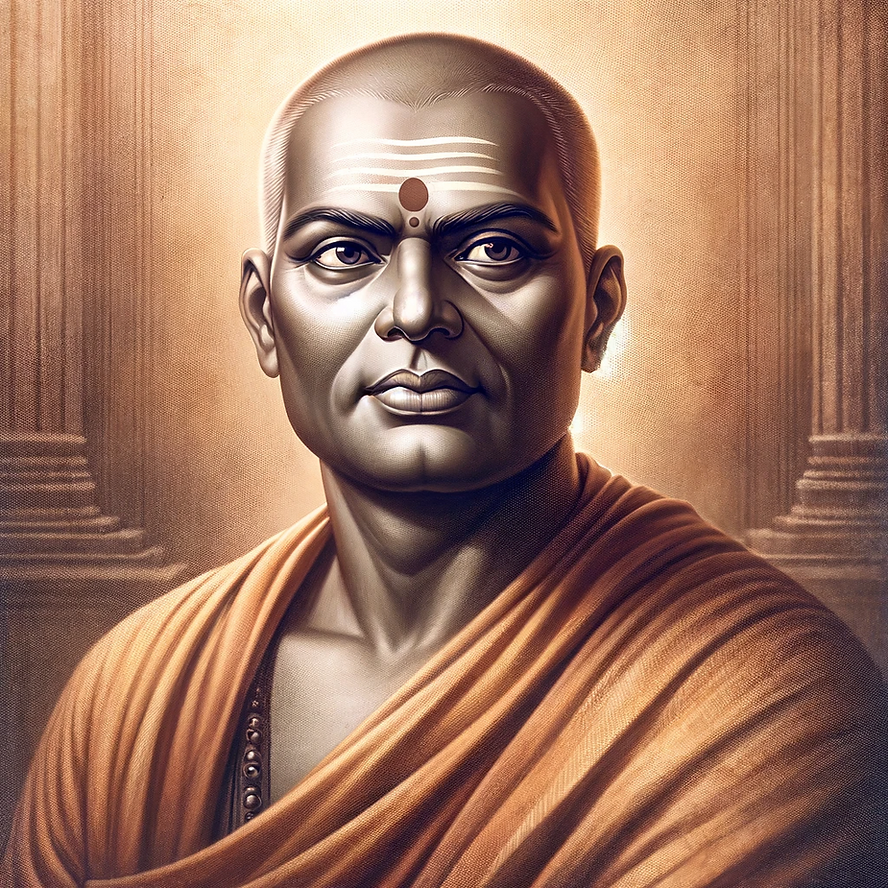
Education is the best friend. An educated person is respected everywhere. Education beats the beauty and the youth.”
“The world’s biggest power is the youth and beauty of a woman.”
“Before you start some work, always ask yourself three questions – Why am I doing it, What the results might be, and Will I be successful. Only when you think deeply and find satisfactory answers to these questions, go ahead.”
Swami Vivekananda: The Spiritual Leader of Modern India (1863-1902)
A key figure in the introduction of Indian philosophies of Vedanta and Yoga to the Western world, Swami Vivekananda emphasized the importance of personal purity and service to others as central to spiritual growth. He was a major force in the revival of Hinduism in the modern age and contributed to the concept of nationalism in colonial India.

“Arise, awake, and stop not till the goal is reached.”
“Truth can be stated in a thousand different ways, yet each one can be true.”
“The more we come out and do good to others, the more our hearts will be purified, and God will be in them.”
Rabindranath Tagore: The Poetic Philosopher
- “Love is an endless mystery, for it has nothing else to explain it.”
- “Depth of friendship does not depend on length of acquaintance.”
- “Let your life lightly dance on the edges of Time like dew on the tip of a leaf.”
Mahatma Gandhi: The Apostle of Peace and Non-violence
- “Be the change that you wish to see in the world.”
- “The best way to find yourself is to lose yourself in the service of others.”
- “Strength does not come from physical capacity. It comes from an indomitable will.”
Adi Shankaracharya: The Proponent of Advaita Vedanta
An 8th-century philosopher, Adi Shankaracharya revitalized Hinduism by establishing the non-dualistic school of Advaita Vedanta. He taught that the ultimate reality, Brahman, is the singular unchanging truth behind the universe, with the self (Atman) being identical to Brahman.
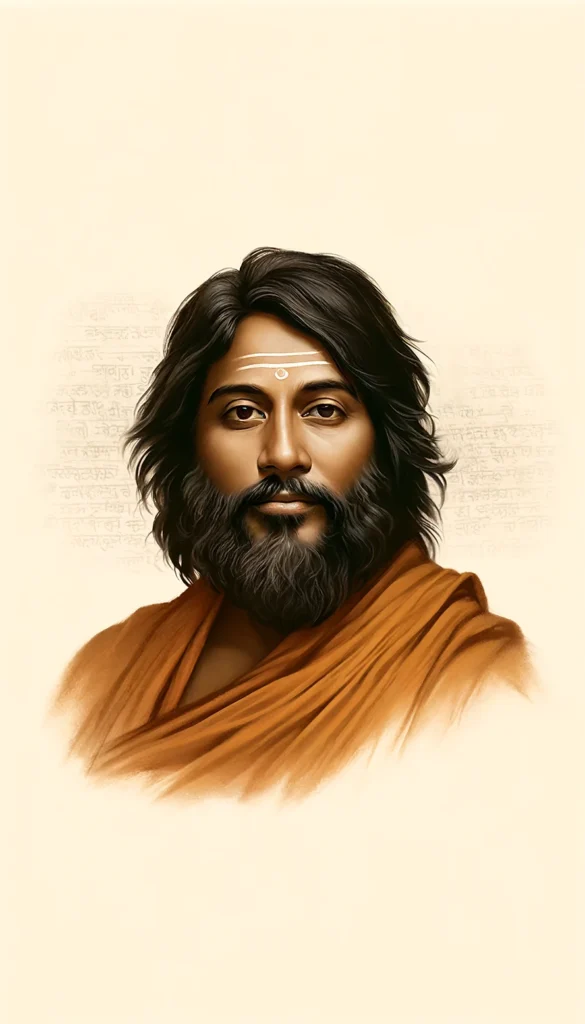
“The world is a book, and those who do not travel read only one page.”
“Knowledge is indeed better than blind practice; meditation is better than knowledge; renunciation of the fruits of action is better than meditation; peace immediately follows renunciation.”
“Brahman is the only Truth, the world is illusion, and there is ultimately no difference between Brahman and individual self.”
Jiddu Krishnamurti: The Philosopher of Freedom
A 20th-century philosopher, Krishnamurti rejected all organized belief, ritual, and authority, promoting a philosophy that emphasized personal insight and understanding of the mind and relationships. He advocated for a realization of profound psychological change through critical self-awareness (Winspire Magazine).

“It is no measure of health to be well adjusted to a profoundly sick society.”
“The ability to observe without evaluating is the highest form of intelligence.”
“Freedom from the desire for an answer is essential to the understanding of a problem.”
Sarvepalli Radhakrishnan: The Philosopher-President of India
- “When we think we know, we cease to learn.” – A reminder of the importance of continuous learning and humility.
- “Books are the means by which we build bridges between cultures.” – Highlighting the role of literature in cultural understanding.
- “The true teachers are those who help us think for ourselves.” – On the role of educators in fostering independent thought.
Kabir: The Mystic Poet
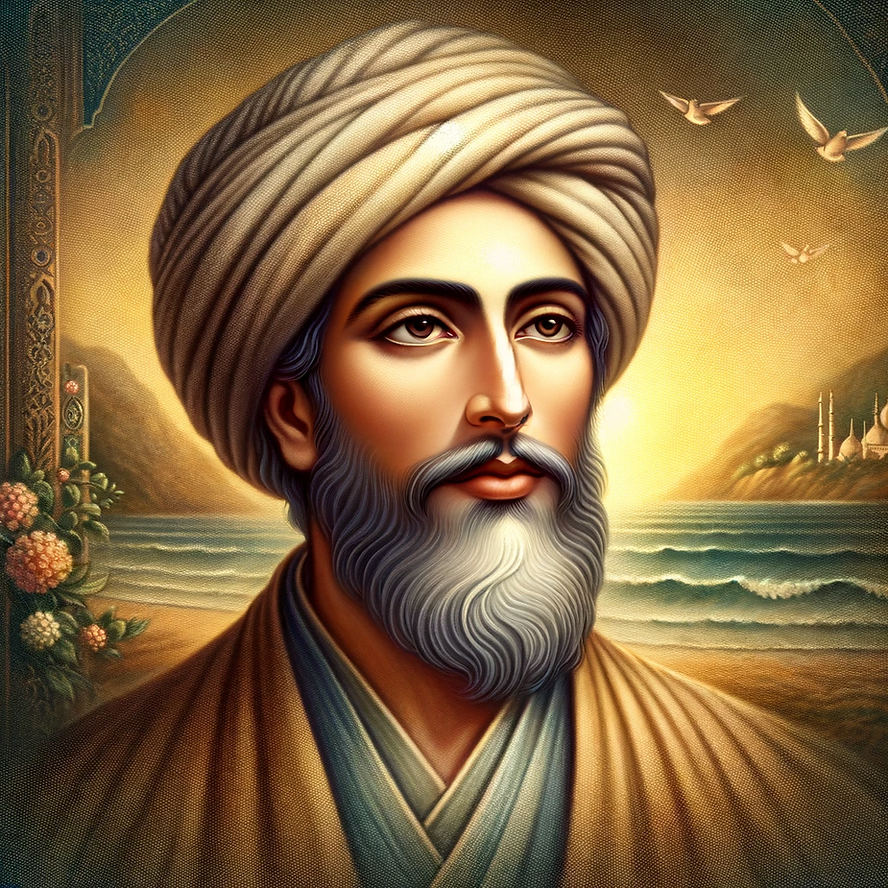
- “The river that flows in you also flows in me.” – Kabir’s poetic expression of the unity of all beings.
- “If you don’t break your ropes while you’re alive, do you think ghosts will do it after?” – A call to break free from limitations and dogmas.
- “Wherever you are is the entry point.” – The idea that spiritual awakening can begin at any point in life.
Mirabai: The Devotional Poetess of Passion
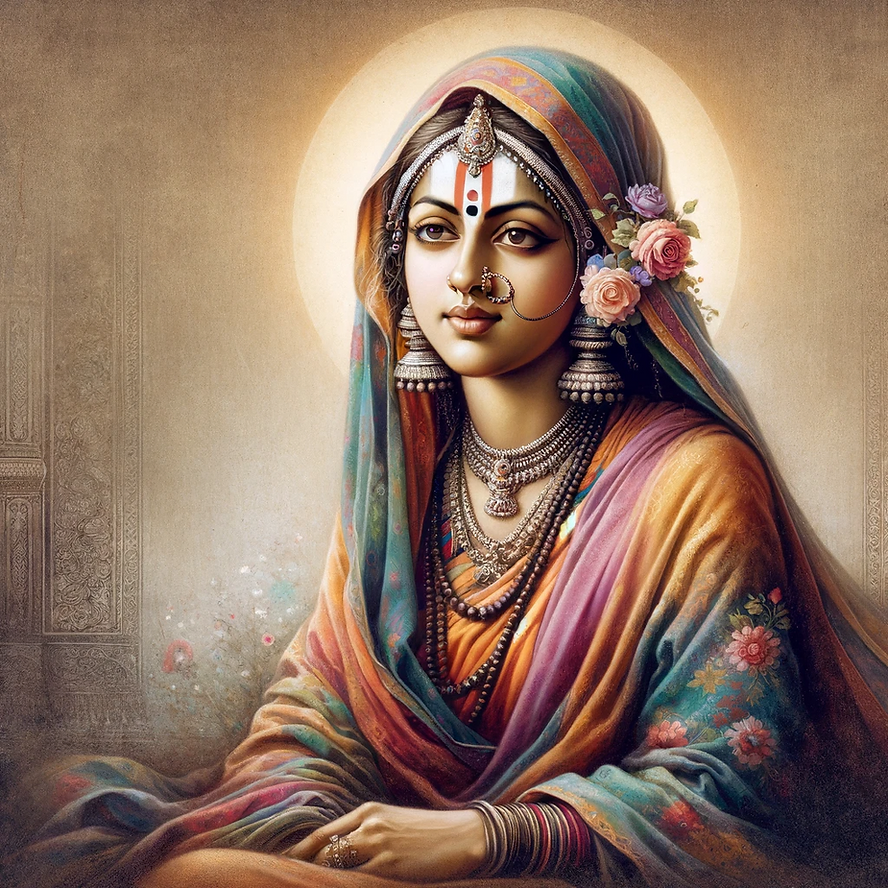
- “I am dyed in the color of your love.” – Mirabai’s expression of deep, spiritual devotion.
- “The love of my beloved is on every tongue.” – Reflecting the universal nature of divine love.
- “Why wander in the forest of worldly pleasures, when the bliss of true love is within you?” – Encouraging the pursuit of spiritual fulfillment over worldly desires.
Osho: The Controversial Mystic and Guru
Osho, born as Bhagwan Shree Rajneesh, was an Indian mystic and spiritual leader who gained international fame in the 1970s and 1980s. His teachings, a blend of Eastern philosophies like Buddhism, Hinduism, and Sufism with Western psychology and modern thought, resonated with a global audience seeking personal and spiritual liberation.
Osho’s communes in India, particularly the opulent Rajneeshpuram in Oregon, USA, became centers of controversy. He was known for his unconventional lifestyle, including his flamboyant attire, Rolls-Royce collection, and open sexuality. These aspects, along with accusations of cult-like practices and tax evasion, led to widespread criticism and legal battles.
Despite the controversies, Osho’s impact on contemporary thought is undeniable. His books and discourses continue to inspire millions worldwide, exploring themes of love, freedom, meditation, and the search for inner peace. He remains a significant figure in the history of spirituality, sparking debates and inspiring introspection in seekers of truth.
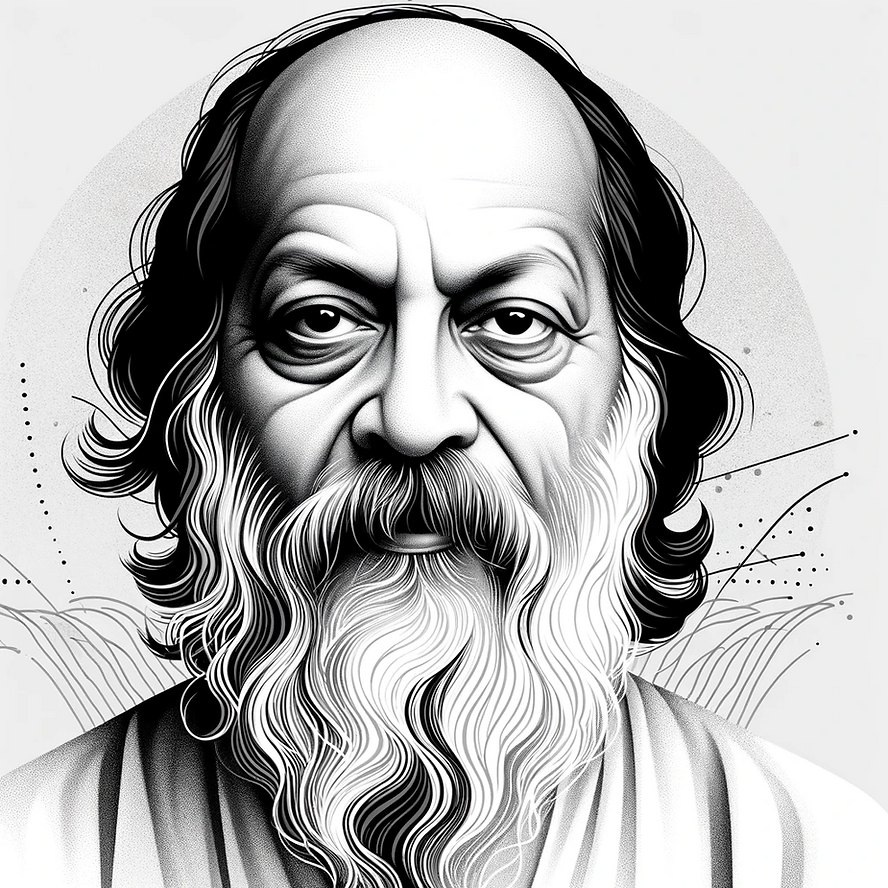
- “Be — don’t try to become.” – Osho’s call for authenticity and being present in the moment.
- “Life begins where fear ends.” – Highlighting the liberating power of overcoming fear.
- “The greatest fear in the world is of the opinions of others.” – A perspective on the importance of individuality and self-acceptance.
Tulsidas: The Saint Poet of Hinduism
Born in the 16th century, Tulsidas was a revered Indian poet and devotee of Lord Rama. He is best known for authoring the Ramcharitmanas, a Hindi retelling of the Ramayana that profoundly shaped Indian culture.
Tulsidas’s other notable works include Vinaya Patrika, Hanuman Chalisa, and Kavitavali. His writings are renowned for their devotional intensity, literary grace, and social commentary, making him a cornerstone of Hindi literature and a highly revered saint in Hinduism.
Tulsidas’s most famous quotes, offering insights into devotion, and wisdom in Sanskrit:
“राम नाम जपो निरंतर, होई सब संकट हरतर।”
Translation: “Continuously chant the name of Rama, and all your troubles will be overcome.”
Emphasizes the power of devotion to Lord Rama.
“सियाराम मय सब जग जानी। करउं प्रनाम जोरि जुग पानी।”
Translation: “Knowing the entire world to be permeated by Sita and Rama, I bow down with folded hands.”
Highlights the divine presence in all of creation.
“परहित सरिस धर्म नहिं भाया, पर पीड़ा सम नहिं अधमाया।”
Translation: “There is no virtue greater than benefiting others, and no vice greater than causing suffering to others.”
Emphasizes the importance of compassion and selfless service.
“मन चंगा तो कठौती में गंगा।”
Translation: “If the mind is pure, even a well can be as sacred as the Ganges.”
Suggests that true purity resides within the individual, not in external places or rituals.
“जहाँ सुमति तहँ सम्पत्ति नाना।”
Translation: “Where there is wisdom, there is abundance.”
Emphasizes the value of wisdom and its ability to lead to prosperity and fulfillment.
“राम नाम जपो निरंतर, होई सब संकट हरतर।”
Translation: “Continuously chant the name of Rama, and all your troubles will be overcome.”
Reiteration of the power of devotion to Lord Rama.
“संत समागम संगति साधु की, मन मंदिर निर्मल होय।”
Translation: “The company of saints purifies the mind.”
Highlights the importance of associating with virtuous individuals for spiritual growth.
“दुःख में सुमिरन सब करें, सुख में करत न कोई। जो सुख में सुमिरन करत है, दुःख का दरस न कोई।”
Translation: “Everyone remembers God in times of sorrow, but few do so in times of joy. Those who remember God in times of happiness will never experience sorrow.”
Emphasizes the importance of constant remembrance of the divine, not just in times of need.
“सत्यम वचनम ब्रूयते, धर्मचरणं चरति।”
Translation: “Speak truthfully and live a righteous life.”
Emphasizes the importance of honesty and ethical conduct.
“राम नाम रसिया, सब दिन बसिया।”
Translation: “The devotee of Rama dwells in the bliss of His name every day.”
Describes the state of constant joy experienced by those who are devoted to Lord Rama.
Sadhguru: The Modern Mystic and Yogi

Sadhguru, born Jaggi Vasudev in 1957 in Mysore, India, is a renowned spiritual leader and founder of the Isha Foundation. He embarked on a spiritual path after experiencing profound inner transformations at the age of 25, leading him to teach yoga to share his insights. His teachings, which don’t align with any specific religion or belief system, aim to enhance human perception and achieve spiritual enlightenment through methods that integrate aspects of yogic sciences.
He established the Isha Foundation in 1992, which offers yoga programs and conducts social outreach initiatives, including environmental conservation campaigns like Project GreenHands and Rally for Rivers. Sadhguru is also an author, having penned books like “Inner Engineering” and engages actively with the global community to discuss issues related to spirituality and self-realization at forums like the World Economic Forum and the United Nations.
Sadhguru’s approach is known for its practicality and relevance in addressing the personal and societal challenges of our times. He emphasizes the importance of inner transformation, which he believes can lead to a more harmonious and balanced life (Wikipedia) (Sadhguru’s Isha ) (Biography Online) (Sadhguru’s Isha ).
“The only way out is in.” – Sadhguru’s guidance on self-exploration and inner discovery.
“If you resist change, you resist life.” – Encouraging adaptability and acceptance of life’s dynamism.
“Your wellbeing is not just about your happiness. It’s about the wellbeing of everything around you.” – A holistic view of wellbeing, extending beyond the individual.
Tagore: The Universal Poet
- “Faith is the bird that feels the light when the dawn is still dark.” – A beautiful metaphor for faith and optimism.
- “Everything comes to us that belongs to us if we create the capacity to receive it.” – The law of attraction and readiness.
- “Music fills the infinite between two souls.” – The transcendent power of music in human connection.
Dayananda Saraswati: The Reformer of Hinduism
- “Go back to the Vedas.” – His call for a return to the ancient scriptures for spiritual enlightenment.
- “He who sees all beings in the Self, and the Self in all beings, hates none.” – A universal vision of oneness and compassion.
- “The truth does not require any propaganda; it stands by its own force.” – The inherent power of truth.
Ibn Sina (Avicenna): The Persian Polymath
- “The knowledge of anything, since all things have causes, is not acquired or complete unless it is known by its causes.” – Avicenna’s approach to understanding through causality.
- “Medicine is not only a science; it is also an art.” – Recognizing the complexity and depth of medical practice.
- “Life is a preparation for the future; and the best preparation for the future is to live as if there were none.” – A perspective on living in the present while being mindful of the future.
Nizami Ganjavi: The Great Romantic Poet
- “Love is that flame which, when it blazes up, consumes everything else but the beloved.” – Expressing the all-consuming nature of love.
- “A man is insensible to the relish of prosperity until he has tasted adversity.” – The value of adversity in appreciating life’s blessings.
- “One who has no beloved in the world is the most alienated and destitute.” – The fundamental human need for love and connection.
Rumi: The Poet of the Soul
- “The wound is the place where the Light enters you.” – Emphasizing the transformative power of suffering.
- “You are not a drop in the ocean. You are the entire ocean in a drop.” – The unity and vastness within each individual.
- “Let the beauty of what you love be what you do.” – Encouraging the pursuit of passion and love in one’s actions.
Aurobindo Ghose: The Spiritual Revolutionary
- “True knowledge is not attained by thinking. It is what you are; it is what you become.” – The deeper understanding that comes from being and becoming.
- “All life is Yoga.” – The integral nature of life and spiritual practice.
- “The sign of a great man is his humility.” – The importance of humility in greatness
Sri Ramakrishna: The Mystic of Dakshineswar
- “As long as I live, so long do I learn.” – The lifelong journey of learning.
- “The winds of grace are always blowing, but you have to raise the sail.” – The role of personal effort in receiving divine grace.
- “He is born in vain who, having attained the human birth, so difficult to get, does not attempt to realize God in this very life.” – The spiritual purpose of human life.
Sri Ramana Maharshi: The Sage of Arunachala
- “Your own Self-realization is the greatest service you can render the world.” – The impact of personal enlightenment on the world.
- “The only useful purpose of the present birth is to turn within and realize the Self.” – Emphasizing the importance of self-discovery.
- “Silence is the true teaching.” – The profoundness of silence as a form of spiritual instruction.
Paramahansa Yogananda: The Messenger of Kriya Yoga
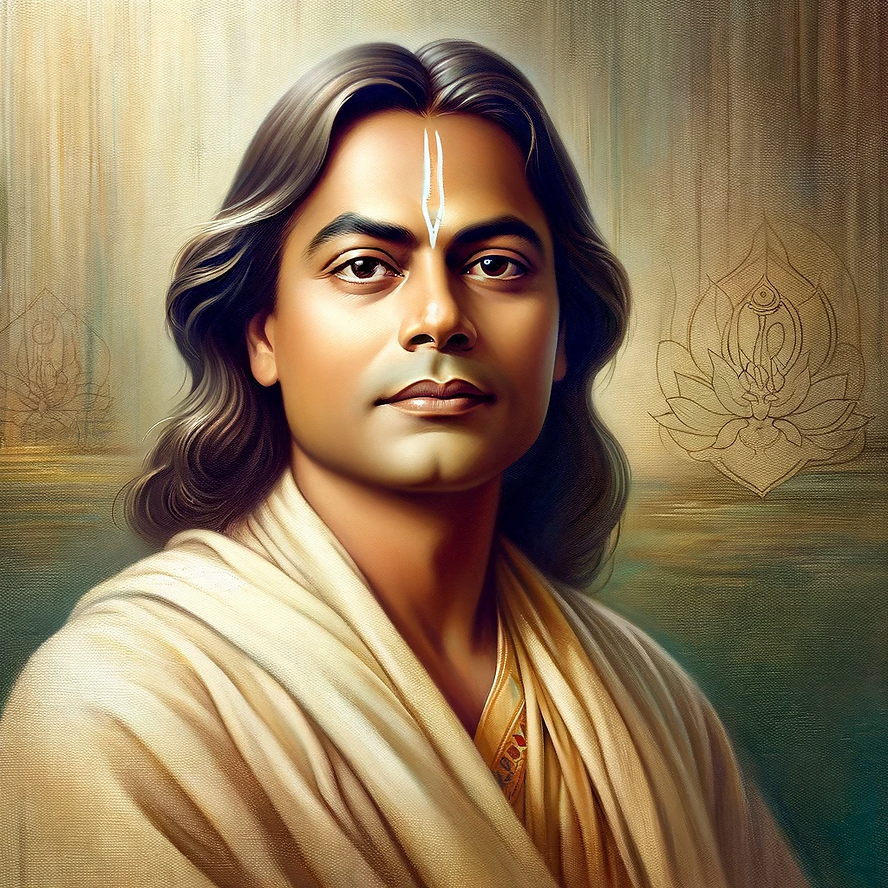
- “Change yourself and you have done your part in changing the world.” – The idea that personal transformation leads to global change.
- “The season of failure is the best time for sowing the seeds of success.” – Finding opportunity in adversity.
- “A room without books is like a body without a soul.” – The value of knowledge and learning.
Gautama Buddha: The Enlightened One
Gautama Buddha: Founder of Buddhism in the 6th century BCE, Gautama Buddha’s teachings focus on suffering, its causes, and methods to eliminate it. His philosophy of the Middle Way advocates for a balanced approach to life, emphasizing ethics, mindfulness, and meditation (Encyclopedia Britannica).

- “Do not dwell in the past, do not dream of the future, concentrate the mind on the present moment.” – Advocating the practice of mindfulness.
- “Three things cannot be long hidden: the sun, the moon, and the truth.” – The inevitability of truth coming to light.
- “To understand everything is to forgive everything.” – Highlighting the power of understanding in fostering forgiveness.
Amartya Sen: The Economist and Philosopher
- “Poverty is the deprivation of opportunity.” – A profound view on the nature of poverty.
- “Freedom is not an end in itself but a means to an end.” – The instrumental value of freedom in achieving greater goals.
- “Identity is a powerful force, but it can also be a source of considerable confusion.” – On the complexities of personal and social identity.
The philosophies of these great thinkers from Asia and India are not just intellectual exercises; they are practical guides for living a fulfilled and meaningful life. Their words encourage us to question, reflect, and grow, reminding us of the profound depth and diversity of human thought.
As we explore these quotes, we come to realize that wisdom knows no geographical boundaries. It is a universal heritage that belongs to all of humanity. These philosophers, with their varied backgrounds and perspectives, contribute to a collective understanding of life, consciousness, and the universe.
Their teachings continue to inspire, challenge, and enlighten us, providing a beacon of light in our journey through life. They remind us of the richness of our inner worlds and the vast potential for growth, understanding, and compassion that lies within each of us.
In conclusion, the wisdom of these Asian and Indian philosophers is a treasure trove of insight and inspiration. As we navigate the complexities of the modern world, their timeless words offer guidance, solace, and a path to deeper understanding and self-realization.
“In conclusion, the legacy of these Indian Philosophers and Spiritual Leaders is a testament to the enduring power of philosophical wisdom in guiding and inspiring generations.”
#Indian Philosophers #Wisdom #Quotes



Excellent beat ! I wish to appprentice even as you amennd your site, how could i subscribe for a blog web
site? The account helped me a acceptable deal. I have been tiny
bit acquainted of this your broadcast offered brilliant transparent idea.
awesome